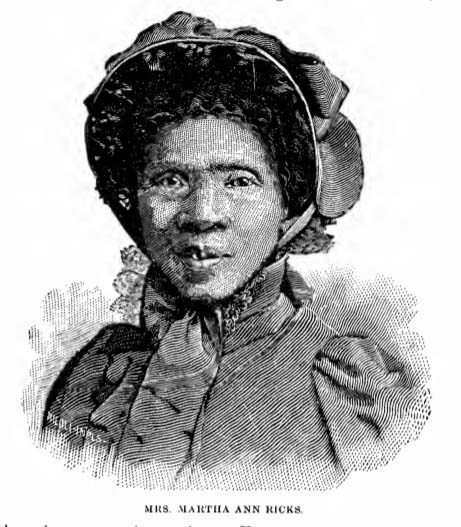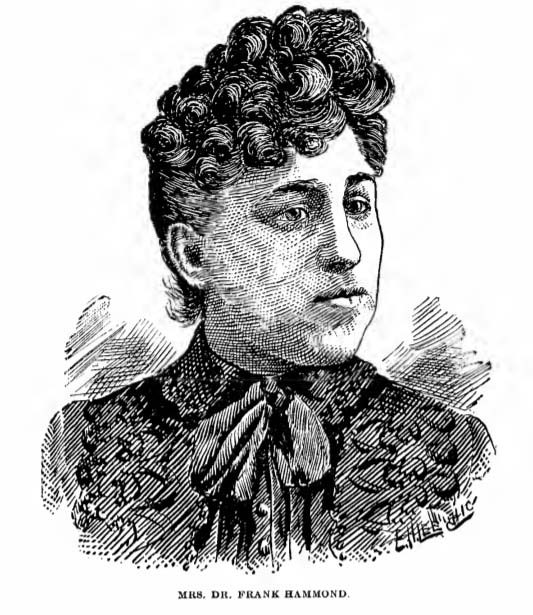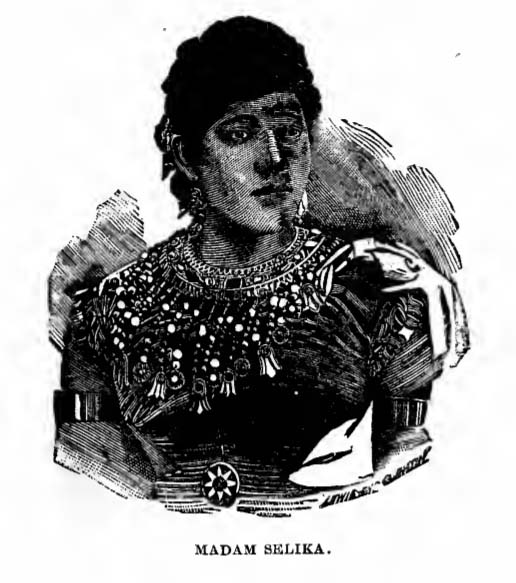|
Page 304
MRS.
MARTHA ANN RICKS.
Liberian Heroine.
AMONG the few Negro women of Liberia whose fame as
philanthropists and race agitators is not circumscribed,
but has become universal in both England and America,
Mrs.

MISS MARTHA ANN RICKS
Ricks
enjoys a prominent place. For many years her voice
and pen have championed the cause of Liberia. Her
prosperity has
[Page 205]
largely depended on the unabating efforts of her loyal
citizens, and, regardless of sex, her leading women have
figured very
conspicuous in the accomplishment of every success she
has attained.
Mrs. Ricks is a personal friend and
correspondent of Queen Victoria, and this social
attachment has been the cause of constant interchange of
mementoes. Very recently Mrs. Ricks
presented Queen Victoria with a
"crazy-patch" quilt, which for beauty and exceptional
merit, as well as the high appreciation of the gift, and
her high regard for Mrs. Ricks, the Queen
has placed it among the exhibits of the British Dominion
in the World's Fair, at Chicago. Mrs.
Ricks ranks among the leading women of her time and
place, and justly merits this grand and ennobling
recognition from the grandest ruler on the Eastern
Continent. Her rare worth is all the more
emphasized when taking into consideration the fact that
her prominence asserts itself at home, and among the
leading spirits of Liberia. Her power is felt.
She has made herself an exponent of the progress of the
people on the Dark Continent by energy and push, coupled
with the other exemplary qualifications which are
God-given.
[Page 305]
-------------------------
MRS.
DR. FRANK HAMMOND.
Race Leader.
THE remarkable signs of the times setting forth the
progress of the race, based upon facts, and figures, are
prophetic of what the race may accomplish in the world.
With every facility to thoroughly fit and prepare the
Negro to take his place along with the other great
races, no one of us can grow discouraged over our
possibilities.
Mrs. Hammond is a convincing unit of our
progress, and demonstrates the fallacy of all doubts
which have dawned upon the vision of the skeptics of her
section. She is a forcible writer, a strong
advocate, an active scholar in the cause of Negro
progress—not easily discouraged, possessing very much
physical force, strong and striking qualities capable to
lead.
[Page 306]
Her decision and discretion are very strongly marked.
Her vitality bespeaks forth a long and active career in
the cause of human prosperity.

MRS. DR. FRANK HAMMOND
Alderson, West Virginia, being her home, she is so
situated as to meet and explode the doctrines of
incapacity, so often
the ignorant conception of the Southerners regarding our
intellectual progress.
[Page 307]
MADAM
SELIKA.
Singer of French and Italian Operas.
THE world has heard Madam Selika and has been
delighted with her singing. The press every where
has spoken in very high praise of the wonderful range of
her sweet voice, the masters in music have found new
beauties in their songs when sung by her, and in no
compromising terms have placed her where she rightly
belongs, second to none of her

MADAM SELIKA
time. Parody
nicknaming is a peculiar popularity in which many of her
profession seem to have distinguished themselves, but
Selika needs no gilding.
She has played as Selika and her successes
demonstrate that Selika is quite as convenient a
name as she could have. We may diverge from the
general rule, in treating of distinguished women who
have figured so very conspicuously as she, and say that
there really is something in a name, and that
[Page 308]
name she has, by the cultivation of her voice, dignified
and made quite as prominent as the many adopted by
persons not near her equal. She has, by study and
unceasing practice in the foreign languages, prepared
herself so artistically in the realm of song as to
acquit herself far beyond the expectations of the many
thousands who have flocked to hear her.
Indeed she is so well known, and the sentiment is so
general as to her excellency in her art, that she
requires no additional comments.
She continues to raise the scale of our intellectual
possibilities, and demonstrate before the world that the
Negro can not only sing jubilee songs, and ballads, but
they can enter all the repository of music and song, and
discriminate between the lettered and unlettered operas,
yea, can sing the French and Italian as well as the
English operas.
Madam Selika has been on the stage
seventeen years, during which time she has traveled five
years in Europe, has sung before the Czar of Russia, and
her many triumphs abroad have won for her such fame as
no other Negro woman of our time can boast. By
special invitation she has sung for President Hayes,
and on more than a dozen occasions where thronged
thousands of the lovers of her sweet intonation, she has
been universally pronounced "the greatest colored singer
of the globe."
We append below a brief extract from The Colored
American, on the event of her expected appearance before
a Washington audience:
"SELIKA CONCERT POSTPONED.
" Despite the awful inclemency of the weather, hundreds
came to hear the greatest colored singer of the globe
last Wednesday night. Postponed until Monday night, May
8th. Everybody will be there. Tickets for
Wednesday night good on Monday night.
" The concert to be given Wednesday night would,
without doubt, have drawn the largest gathering ever
assembled in the Metropolitan Church on M street
northwest. The talent and programme were the
finest, combining in one the magnificent
[Page 309]
soprano, Madame Selika; the peerless
little Lotta, the renowned tenor and
instrumentalist, Prof. Laurence, and the
famous baritone, Prof. Velosko. But
Ćolus and
Jupiter Pluvius took a hand in the matter
with disastrous results. These old and antiquated
gentlemen, who never wore white shirts and laundried
collars and had no such musical artist to please their
tympani with musical strains, concluded and did give us
a combination of wind and water that made all shiver in
their boots.
"The many people who bravely faced the rainstorm on
last Wednesday night showed the appreciation in which
Madam Selika, Profs. Laurence and
Velosko and Little Lotta are held by
the Washington people. The concert was postponed
until Monday night, May 8, 1893, to accommodate the many
who did not come out Wednesday night. Everybody
will be there at 8 p. m. sharp. The managers of
the concert have decided that all tickets issued for
Wednesday night will be good on Monday night. The
managers have also arranged 'A Parlor Match ' with Mr.
Ćolus and
Mr. Jupiter Pluvius, and they will
take 'A Night Off ' ' Down On the Bowery,' and will not
be here to interfere with 'The Crust of Society,' "
Her rightful position as an accomplished singer is by
the side of Jenny Lind, Parodi,
Nilsson, Patti and Elizabeth Taylor
Greenfield. When other aspirants for such
honors from the public pulpit and press startle the
world with their matchless voices, as Selika has,
shall shine upon our musical horizon and have dignified
as well their names, they, as she, will be doing much to
compensate for the evil practices of some who feel
honored in passing a mimetic name. "There all the
honor lies."
-------------------------
MRS.
SARAH LEE.
A Noble Mother and Race Benefactor.
MRS. SARAH LEE, the mother of Bishop B. F. Lee,
was one of a family of nine children - seven girls and
two boys, and was born in the year 1818, in Cumberland
county, N. J. She was the daughter of Benjamin
and Phebe Gould, and comes of an old family, tracing
from one generation to
[Page 310]
another, in regular succession, to the first settlers of
New Jersey, ranking with Sir George
Carteret and John Fenwick, and other
English Quakers who secured that part of the State from
William Penn. Sarah is fifth
in generation. Her father possessed a small farm
and large tract of woodland, and did an extensive
business in the hoop-pole trade. There being so
many more girls than boys, Sarah was often called
into service out of doors as well as in the house; and
in such rural pursuits and activities her early life was
spent.
The educational facilities of the country were those of
the earlier ages, and the three E's were taught in the
winter months, and by this Sarah acquired a
common school education. She was always fond of
books and study, and was considered both handsome and
accomplished. At the age of twenty-one she was
married to Abel Lee, who was also one of a
large family and native of the same State. They
settled in life and purchased a small farm, and had six
children, three girls and three boys, born to them.
But, alas! when the eldest had only attained the age of
thirteen years the hand of death took away the fond
husband and loving father, and left the children orphans
and Sarah a widow. She has never fully aroused
from that stolid grief; but with a set purpose and firm
will she turned her face to the world to defend and take
care of her children and sustain the honor of her
husband. His promises of debts on the place she
would pay, and though the law of New Jersey would not
claim such she did pay to the last dollar; and she had a
home secure for her children and herself in her
declining years.
As she began to have a little leisure in life her love
of reading increased; she sought the strongest minds and
information from the best authors in literature.
Of her children she has lived to see them all grow up
to honorable man and womanhood: the girls and one son,
the bishop, to marry; two sons still remain at home with
her; one of them, who had become a smart farmer worth
several thousand dollars, is afflicted with blindness,
upon whom she waits now with tenderest care.
[Page 311]
A great lesson of life is taught by this woman having
lived —that in working out the every day affairs we are
laying foundations deep and strong; that at home,
and unobserved, we are sending minds to search for the
beautiful, the great and good, and verifying the saying
that thoughts spoken in the bedchamber are repeated on
the housetops, and that honor, strength and perseverance
will bring forth a never-failing harvest; so surely as
it is said, what a man sows shall he also reap.
| |
|
MRS. ALICE S. FELTS,
6 Emerson st., New Bedford, Mass. |
-------------------------
MRS. MARY E. LEE.
Educator.
MARY E LEE, wife of Bishop B. F. Lee, was
born in Mobile, Ala. In this sunny clime she spent
the earliest days of her childhood.
In about 1858 her parents moved to Wilberforce, Ohio,
and there on a farm, near the college, the days of her
youth were spent. She attended Wilberforce
University and graduated in 1873, receiving the degree
of Bachelor of Science, and composed the "Class Ode."
Previous to the completion of her course she had two
years' experience as a teacher in Mobile, Ala., and was
quite a successful teacher.
At an early age she showed great talent for writing.
Poetry seemed to be her specialty, for there was
something in the natural surroundings of Wilberforce
which harmonized with her nature, and inspired her
thoughts.
On Dec. 30, 1873, she was married to Rev., now
Bishop, B. F. Lee, then a professor at Wilberforce,
and during his presidency of eight years her influence
was greatly felt by the pupils.
For many years she has from time to time contributed
poetry and prose to The Christian Recorder, and
also to the A. M. E. Review and other journals,
and is at present editor
[Page 312]
of "The King's Daughters" department of Ringwood's
Journal.
She has written many short poems, and several lengthy
ones, such as "Tawawa," and " Afmerica." Although
still young, she has seen much sorrow, having lost by
death both father and mother, with two brothers and five
sisters since her marriage, and having been the mother
of nine children, three of them have been carried to the
better land, so that now, but for a number of nieces and
nephews, she would be quite alone in the world; yet she
is of a cheerful and pleasant temperament, treating
every one she meets with affability, and all who come to
her home are met with a generous welcome and made to
feel at ease during their stay. As a wife and
mother, she is very devoted and careful, overseeing the
management of her house, and, to some extent, the
education of her children and controlling every
department with a skill that brings success.
As has been said, during the eight years that her
husband was president at Wilberforce University, she was
a great help to him in caring for the students and
helping them with their studies; there are many young
women, and men as well, who owe to her, and they do not
fail to recognize it, a debt of gratitude for the
instruction and sympathy they have received while
students, at that university.
Her reading has been extensive and varied, her book
stands abounding only in the classics of both prose and
poems, but also of the latest and most wide-awake
authors, so that she continually revels in a wealth of
literature equaled by few of her race.
<
CLICK HERE to RETURN to BIOGRAPHICAL INDEX > |